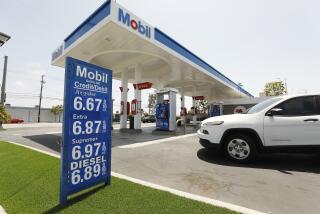Gas prices have peaked before mid-May just once in last 20 years
Gasoline prices are dropping for the second straight week, but don’t get too excited. Fuel prices have peaked before mid-May just once in the past 20 years, according to Energy Department statistics, and it hasn’t happened since 1998.
History suggests that the national average won’t peak before mid-May at the earliest.
The national average for a gallon of regular gasoline fell to $3.907, down another 2 cents since last week, according to the AAA Fuel Gauge Report. Fuel prices first began to fall in California about a month ago, although the decline has been slow. The average price for a gallon of gasoline in California is $4.221, down 4.3 cents since last week and off 13.2 cents since last month.
In 1998, the national average hit its high for the year on Jan. 12th, at $1.094 a gallon, according to the Energy Department. Since then, the peak hasn’t been reached before May 14th. More than half of the time over the past 20 years, gasoline prices have peaked between mid-May and Labor Day, according to Energy Department records.
Gasoline prices tend to rise in May as demand also climbs just before the traditional start of the summer driving season, on the Memorial Day holiday weekend. That’s according to John Kilduff, founding partner of the New York Investment group Again Capital.
Part of the driving force for higher prices in May, Kilduff added, is speculation over whether summer gasoline supplies will be sufficient. Over the past several years, Kilduff added, “prices have tended to peak in May and then they fall throughout the summer.”
Phil Flynn, an analyst for PFGBest Research in Chicago, said that gasoline prices usually peaked around the July 4th holiday, until 1995, when the federal government mandated more expensive and cleaner burning summer-blend gasoline.
“The switchover from cheaper winter blends to summer blends is usually over by the beginning of May, and that’s one reason why prices tend to rise in May,” Flynn said.
Another observer, GasBuddy.com senior petroleum analyst Patrick DeHaan, said that the next few weeks would be difficult to predict.
“The only thing I remain sure of with gasoline prices is that things will remain quite volatile the next four to six weeks,” DeHaan said. “Last week we saw a refinery fire on the West Coast drive up prices instantaneously. It’s these events, the unforeseeable reaction, that gives me reason to say that prices may continue to swing upward and down.”
RELATED:
Why are gasoline prices so high?
Energy Dept.: gas prices to peak at $4.01
SoCal gas prices fall for the 4th straight week
More to Read
Inside the business of entertainment
The Wide Shot brings you news, analysis and insights on everything from streaming wars to production — and what it all means for the future.
You may occasionally receive promotional content from the Los Angeles Times.











